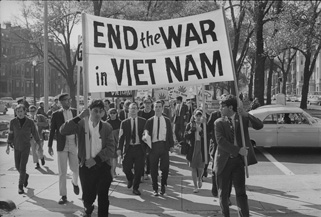TV Recap - The Vietnam War: Episode 2, Part 2
By Mark Light
September 28, 2017
BoxOfficeProphets.com

After the battle of Ap Bac, South Vietnam faced civil strife that had very little to do with the Viet Cong. Vietnam was 70% Buddhist, but South Vietnam was ruled by a Roman Catholic minority. In the spring of 1963, in the ancient city of Hue, Christian flags had been flown to celebrate the 25th anniversary of Ngo Dinh Diem's older brother being ordained as a Catholic bishop. When the Buddhists of Hue flew their flags to celebrate the 2,527th anniversary of the birth of Lord Buddha, police tore the flags down.
People took to the streets to protest. Security forces were sent in to suppress the demonstrations. The soldiers opened fire and eight protesters were killed; the youngest was 12 and the oldest was 20. Diem tried blaming the Viet Cong but no one believed it. Buddhist monks throughout South Vietnam demanded an apology. They also demanded an end to religious discrimination by Diem's government. As Diem had alienated the rural population, he now was alienating the urban population.
American officials pressed Diem and his brother Nhu (head of South Vietnamese secret police) to make concessions to the Buddhists to keep the focus on the fight against communism. They refused.
On June 10th, 1963, Malcolm Brown of the Associated Press received an anonymous tip. Something important would happen the next day at a major intersection in Saigon. To protest the repression, a 73-year-old monk name Quang Duc had himself doused in gasoline and set himself on fire. Brown captured it all with his camera. The photo went worldwide, stirring up emotion every place it was published.
Other monks followed Quang Duc's example. And Diem's sister-in-law, famous for not keeping a lid on her tongue, made matters worse with her statements. She said if any more monks wanted to burn themselves, she would supply the matches. The division within the country even reached the military, making its morale problem worse.
The photos of the burning monks made the front pages of the newspapers in America and it also made the television news. Americans involved in the civil rights struggle in the US took notice of Vietnam. The Kennedy administration kept pressing Diem and Nhu for change, and they kept resisting.
Kennedy sent a new ambassador to South Vietnam, Henry Cabot Lodge. JFK hope that the eminence of Lodge would get Diem to take notice of American demands to reform. Diem was unimpressed but promised the outgoing ambassador, Frederick Nolting, that he would take no further steps against the Buddhists.
The night of August 21st, 1963, when Nolting had departed and Lodge was still yet to arrive, Diem cut the phone lines of all senior American officials in Saigon. He then sent his special forces to storm Buddhist pagodas in Saigon, Hue, and several other cities. 1,400 South Vietnamese citizens were rounded up and taken away. Diem declared martial law.
College students protested, so Diem shut down all the universities. High school students then protested so Diem shut down all the high schools and grammar schools. Thousands of school children were arrested. Henry Cabot Lodge arrived and reportedly demanded to Diem that Nhu be fired or US aid to South Vietnam would be cut.
In the wake of this, a small group of South Vietnamese generals contacted the CIA. Nhu was basically in charge of the government now, they said. What would the US think if the generals mounted a coup?
Kennedy and his senior staff were out of DC. An Assistant Secretary of State for Far Eastern Affairs, named Roger Hillsman Jr., took it upon himself to draft new instructions for Lodge. Diem would be given an opportunity to get rid of Nhu. If he would not, perhaps the generals should have their chance.
Kennedy was on vacation in Hyannis Port when he was contacted about the new instructions. He decided to approve it because he thought his senior staff had already endorsed it. They had not.
Lodge read the cabled instructions and decided that not only did Ngo Dinh Nhu have to go, but also his brother, Ngo Dinh Diem. But opinion was still divided at the top of the American government. Robert McNamara, Maxwell Taylor, Lyndon Johnson, and the head of the CIA were all against it because they did not think there was a viable alternative to Diem. Some State Department officials felt that without meaningful change, which Diem opposed, South Vietnam would be lost. Kennedy finally decided to tell Lodge to tell the generals that the United States would not promote a coup, but America wouldn't thwart one either.
On November 1, 1963, an 18-hour battle broke out for control of Saigon. Diem and Nhu surrendered to the coup plotters in exchange for a promise of safe passage out of the country. They climbed into an APC and were murdered soon afterwards.
While South Vietnam seemed jubilant and Lodge felt that war would be victorious if the generals stuck together, Kennedy was not so sure. On November 4, 1963, JFK dictated his thoughts into a tape recorder about the coup. He felt he shouldn't have given his consent to Hillsman's cable without a roundtable discussion. He was appalled by the death of Diem and Nhu. He said, "The question now is whether the generals can stay together and build a stable government or whether public opinion in Saigon will turn on this government as repressive and undemocratic in the not too distant future."
Kennedy wouldn't get the answer to that question, as he was murdered in Dallas 18 days later. The fate of the American involvement in Vietnam now rested on the shoulders of the new president, Lyndon Baines Johnson.
As Sam Cooke's "Mean Old World" plays, the credits roll. Up next is Episode Three "The River Styx (January 1964 - December 1965)."